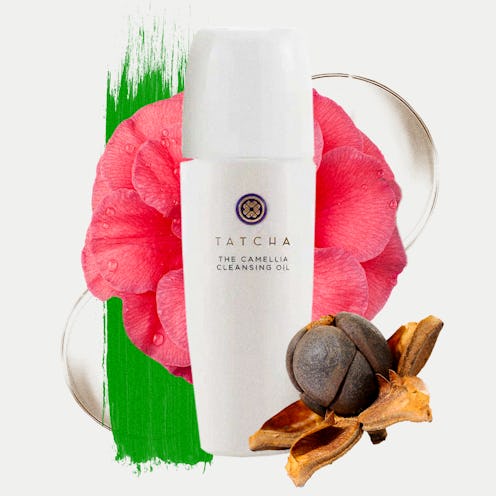(Back To Basics)
Dry Skin & Hair Are No Match For Tsubaki Oil — Here’s Why It’s A Beauty Editor-Favorite
Meet your new winter beauty savior.

With new products, brands, and categories popping up every day, beauty can be a bit overwhelming. Back to Basics is our rudimentary beauty series that serves as your crash course on the science behind some of the best formulations in the game. This week, we investigate tsubaki oil, and how it benefits your skin and hair.
If there's one thing to take away from the vast, and sometimes complicated, world of plant oils in beauty, it's that they're not a one-size-fits-all cure-all; specific types may be more beneficial to you than others, depending on your skin or hair needs. There are deeply hydrating oils that are great for parched hair and skin, like olive oil and argan oil, as well as lightweight types that oily skin can benefit from, like grapeseed. But when your skin and hair need deeper nourishment, tsubaki oil might just be the saving grace for your winter beauty routine.
Tsubaki oil, also known as camellia oil or tea seed oil, is a vitamin- and mineral-rich oil that's cold-pressed from the seeds of the Japanese camellia plant and widely used as a hydrating, nourishing, and soothing ingredient for the skin and hair. But while "tsubaki oil" and "camellia oil" are often used interchangeably, tsubaki oil refers specifically to the oil extracted from camellia japonica, explains cosmetic chemist and co-author of Skincare Decoded Gloria Lu. Not sure which kind of camellia oil your product contains? Check the ingredient list for either "tsubaki oil" or "camellia japonica seed oil."
What Are The Benefits Of Tsubaki Oil?
As for the benefits, "It's rich in oleic acid (omega-9 fatty acid), which serves as an excellent emollient for locking in moisture and protecting both skin and hair from drying," explains board-certified dermatologist Dr. Blair Murphy-Rose.
In addition to oleic acid, board-certified dermatologist Dr. Hadley King says that tsubaki oil also contains high amounts of linoleic acid (or omega-6 fatty acid), which comes with its own slew of benefits: "It's an essential fatty acid that helps support and repair the skin barrier, increasing skin's moisture and increasing elasticity and softness."
Tsubaki oil is also brimming with antioxidants like vitamins A, D, C, and E, explains Dr. Murphy-Rose, which gives it an extra protective punch. These vitamins help protect against oxidative stress from the environment, thus helping to stave off signs of premature aging like photodamage and fine lines and wrinkles.
In terms of hair care, Dr. King points out that this combination of oleic and linoleic acids has other benefits beyond moisture. "Research has found that including oleic and linoleic acid in hair care products helps the scalp absorb other ingredients faster and more efficiently," she says, adding that linoleic acid has also been shown to have anti-inflammatory properties that are great for scalp health.
Who Should Use Tsubaki Oil?
According to cosmetic chemist and Skincare Decoded co-author Victoria Fu, almost anyone can enjoy the benefits of tsubaki oil; however, it's best suited for those with dry skin and hair. It's a relatively lightweight oil that absorbs quickly, penetrating the skin and hair shaft on a deeper level than many other oils; however, the experts agree that it still may be too heavy for anyone with oily or acne-prone skin.
"Tsubaki oil is great for dryer skin types that need to add an extra oomph to their moisturizer game," says Fu. "There are certain plant oils that are lighter in texture, such as rosehip seed and sea buckthorn, that would be more fitting for oily skin types." Due to its highly moisturizing and penetrative nature, Dr. Murphy-Rose also considers it a great pick for anyone with mature skin that may be in need of added moisture.
In terms of allergies and sensitivities, Lu explains that tsubaki oil is generally considered a mild, well-tolerated ingredient, but sensitivities and allergies are always a possibility. As such, she recommends patch testing it first to ensure it doesn't cause a reaction.
How To Use Tsubaki Oil
How you use tsubaki oil in your routine will depend on the kinds of skin or hair products it's formulated into, but as it's most commonly used in moisturizing oils and creams, Lu says that tsubaki-based beauty is safe to use daily, morning and night. However, there's no need to overdo it, either. "I encourage patients to listen to their skin and adjust as needed," says Dr. Murphy-Rose. "If your skin feels well-hydrated one day and not in need of added moisture, you might opt for a lighter lotion or cream that day."
Tsubaki oil generally plays nice with other ingredients, and Dr. King recommends using it in conjunction with other antioxidants to help boost its properties (remember: better penetration). It's also prone to oxidation, so choosing a formula containing added antioxidants like vitamin E can also help protect it from degrading, explains Fu.
Dr. Murphy-Rose adds that while there are no strict rules on what tsubaki oil shouldn't be mixed with, she recommends against using it along with other oil products. "This may contribute to too much oil on the skin [or scalp]," she says.
If you're new to the ingredient, she recommends reaching for a rich body moisturizer that contains tsubaki oil. For a hair routine, she suggests reaching for a tsubaki oil conditioner at least three times a week.
Ready to benefit from the hydrating and nourishing prowess of the camellia japonica plant? Keep scrolling for eight tsubaki oil-based skin and hair products to incorporate into your routine.
We only include products that have been independently selected by TZR's editorial team. However, we may receive a portion of sales if you purchase a product through a link in this article.